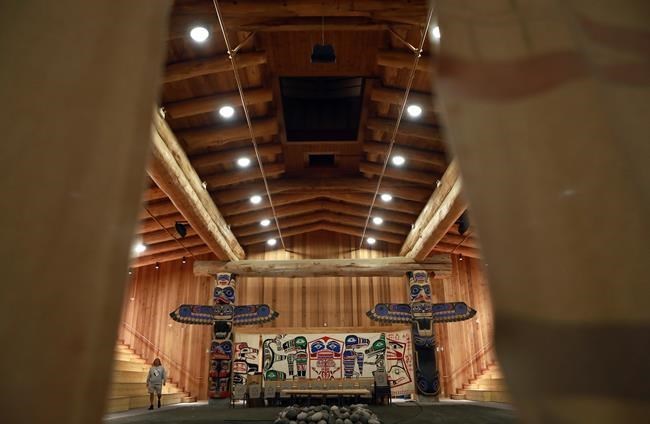BELLA BELLA, B.C. — Maxwell Johnson looked out at empty chairs reserved for two Vancouver police officers who didn't attend an event originally intended to be an Indigenous apology ceremony for the false arrests of Johnson and his granddaughter nearly three years ago.
Johnson said the past three years have been difficult, to the point of being close to suicide, and he pointed to family members nearby at Monday's event as his source of strength.
"I'm having really bad anxiety right now," said Johnson, whose knees were shaking in the moments before he spoke in front of people gathered at Heiltsuk First Nation's cedar-beamed and sandy-floored Big House at Bella Bella, B.C.
"It's been a very traumatizing last three years," he said. "The panic disorder came back really hard after what happened to us."
In December 2019, Johnson took his then 12-year-old granddaughter Tori-Anne to Vancouver to open a bank account, but the pair were wrongly arrested and handcuffed by police when the bank suspected fraud involving an Indian status card.
Johnson's Heiltsuk First Nation planned an apology ceremony set for Monday evening in the central coast community located more than 800 kilometres northwest of Vancouver but replaced it with an "uplifting ceremony" for Johnson and his family when the two arresting officers failed to show up.
Johnson said their absence meant he, his family, and his community can only experience a partial healing from the incident.
“It would have been a great moment to see those officers in here to see what happens,” Johnson said at a news conference earlier in the day. “When we do a ceremony, they’ve got to be here for it to be finished. We can’t come full circle now”
“It’s not only hard on me,” he said. “It’s hard on my family. It’s hard on my community.”
Civilian members of Vancouver's Police Board attended the ceremony, including Vancouver police Chief Adam Palmer.
During the arrest, Johnson and Tori-Anne were placed in handcuffs on the sidewalk in front of the bank.
Johnson said that likely would not have happened to him and his granddaughter if he was non-Indigenous, but he is trying to accept the event as a symbol of how much work needs to be done with regard to systemic racism in Canada.
"I want to thank you for coming here and witnessing what we have to do," he said.
Faye Wightman, Vancouver police board vice-chairwoman, apologized for the "lasting trauma" connected to Johnson's arrest, saying the board and the First Nation must "begin the healing journey together."
The Heiltsuk First Nation issued a statement earlier Monday saying it views the arresting constables' decisions not to attend "as a symptom of the larger systemic failure to acknowledge and take responsibility for systemic racism in the Vancouver Police Department."
The apology ceremony was part of a settlement agreement released last month between Johnson and the Vancouver Police Board. It says the board admits that the conduct of constables Canon Wong and Mitchel Tong contravened the B.C. Human Rights Code "by discriminating against the complainants because of their Indigenous identity, race, and ancestry.”
It included an undisclosed financial award to Johnson and the development of a plan to improve police training on anti-Indigenous racism and "cultural humility."
The settlement also involves a $100,000 payment to the Heiltsuk Tribal Council’s Restorative Justice Department to cover one year of community programming for at-risk youth, including young women who suffer from anxiety due to trauma.
But it did not demand the two constables attend the Bella Bella ceremony. Instead, it committed the board to "ensure best efforts" that the officers attend.
Heiltsuk First Nation Chief Marilyn Slett said the apology ceremony custom calls for the presence of all participants to complete the healing and that Johnson had personally invited the officers.
Slett said the ceremony was meant to mark the start of a new relationship between the Heiltsuk, the Union of B.C. Indian Chiefs and the Vancouver Police Board to work together to address systemic racism in policing.
“The constables’ lack of willingness to walk alongside us and respect our traditions is a continuation of the discrimination that police have shown toward Indigenous people in the past," Slett said.
The Vancouver Police Board said in an earlier statement it is the respondent in the human rights case launched by Johnson, not the individual constables.
"We hope assumptions are not made regarding the constables’ decision not to be at the ceremony. The board will not let this detract from the bigger picture, or our willingness to collaborate and implement change," the statement said.
Johnson settled his rights complaint against the bank in May, which included an undisclosed monetary payment, a private apology, and a pledge from the bank to update its policies on how Indigenous status cards are handled.
Tori-Anne told a news conference last month that she hoped the story of her arrest would encourage more people to stand up against injustice and discrimination.
This report by The Canadian Press was first published Oct. 24, 2022.
Dirk Meissner, The Canadian Press




